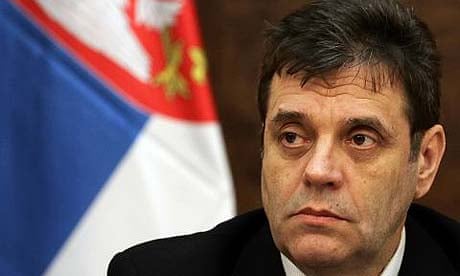Serbia signalled today it would withdraw ambassadors from countries that recognise an independent Kosovo but insisted it would retain diplomatic ties.
As it prepares for the inevitable loss of its southern province, Belgrade drew back from previous threats of severing diplomatic relations with countries that recognise Kosovo.
"Bilateral ties [with countries that recognise Kosovo] most certainly would not be of the quality and level they are today," the Serb president, Boris Tadic, said. "But, if Serbia decides to withdraw its ambassadors, it does not mean it would stop communicating with those countries or cut ties with those countries."
Serbia's prime minister, Vojislav Kostunica, again denounced countries that support independence, saying they were demanding Serbia agree to "slave-like" status.
Kosovo's independence has been carefully choreographed. Britain, France, Germany and the Netherlands are expected to be first to recognise Kosovo as Europe's newest state, with the US following suit soon afterwards.
Other European countries will add their names in successive days, with only Cyprus likely to remain adamant in its refusal to acknowledge the new country, lining up with Serbia and Russia.
In Kosovo itself, the prime minister, Hashim Thaci, announced the creation of a government office to handle the concerns of Serb minorities - an attempt to ease tensions before the province's expected declaration of independence on Sunday.
Thaci said the new cabinet-level office would report to him daily on minority issues.
"No citizen will be discriminated upon or feel left aside," Thaci said.
About 90% of Kosovo's 2 million people are ethnic Albanian. Most minority Serbs live in isolated enclaves and feel vulnerable.
Nato peacekeepers have stepped up security measures, setting up checkpoints in an effort to deter any violence. The 16,000-strong force has also increased its presence in the northern, Serb-dominated part of the province.
In the stronghold of Kosovska Mitrovica, several thousand Serbs met and pledged to reject the Albanian independence declaration and establish their own parallel institutions.
The province's Serb leaders urged calm and patience, but said they would organise protests on Monday in several Serb-held towns throughout the province.
"The monster state will never be imposed and grow here," said Marko Jaksic, a Kosovo Serb leader.
The Serbs objected to the planned EU mission for Kosovo, viewing its arrival as an "act of occupation".
They had threatened to "obstruct and boycott" the work of the police and justice mission that the EU plans to send as a replacement for the current UN administration.
The Kosovo Serbs said they would coordinate with the Serbian government in Belgrade to organise elections for their own local authorities and parliament on May 11, when the rest of Serbia holds municipal elections.
Kosovo has been run by the UN since the 1999 Nato bombing campaign ended a brutal crackdown by Serb troops against separatist ethnic Albanians.
The UN secretary general, Ban Ki-moon, advised staff in Kosovo to stay away from events and celebrations linked to a declaration of independence to preserve the mission's neutrality.
UN staff should not be present at public events surrounding such a declaration of independence or risk being the subject of disciplinary action, Ban reportedly said.
In a sign of underlying tensions, an explosion overnight shattered the windows of a Serb house next to the EU mission offices in Kosovska Mitrovica. No injuries were reported.
Police said the blast was not targeted at international officials.
